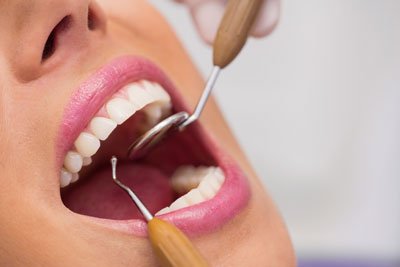
General Dentistry
Good functional teeth help in good nutrition. Research indicates that poor oral health can have a detrimental impact on your general well-being and may even increase your risk of stroke, heart disease and respiratory disease. Good and routine dental care helps restore your dental health and helps you re-establish your general well-being.

Gum Disease
Gum disease or periodontitis is the main cause for tooth loss in adults. Periodontitis is the inflammation of the gums and other structures that support the teeth. If periodontitis is left untreated it progresses and ultimately results in loss of teeth.
We treat patients with these diseases and help them restore and keep their teeth and gums healthy.
General Check & Clean
Regular check and clean helps in maintaining good oral health. Ideally this should occur every six months to a year.
Our dentists during the check and clean visits can detect early warning signs of decay. Most cavities or cracks do not cause pain until they are a major issue, so identifying issues and treating them proactively can prevent further damage to teeth and gums.


Restorations
Restorations are commonly known as “Fillings”. Biocompatible material (such as dental composites) are filled inside the damaged tooth which has lost its function, shape or integrity because of Decay, Fracture or an old defective restoration. Restorations can be divided into two broad categories: Silver (Amalgam) fillings and Tooth Coloured or White restorations. In the past more emphasis was laid on Silver fillings when more advanced filling materials were not discovered.
We are a No Amalgam Practice
Nowadays, in the aesthetic era of dentistry ‘Tooth coloured restorations’ have become the material of choice for a maximum number of patients who choose fillings matching the colour of their teeth. Composite filling are durable and can last up to 10-15 years with very good oral hygiene. With poor oral hygiene, the time is much shorter. Having fillings done at initial stages, can save your teeth in the long term. It can avoid situations requiring tooth extractions and root canal treatment as well as prevent future infections that can cause underlying problems such as gum disease.

Cracked Teeth
Cracked teeth can be very painful especially when chewing or biting. The treatment for cracked teeth can vary depending on severity and ranges from observation to placement of Crown. In severe cases, extracting tooth or root canal treatment may be required. To determine the treatment, the dentist will take an x-ray in addition to physical examination and other tests, and consequently advise treatment options to you.
Teeth Removal
Teeth removal i.e. extraction is performed for a wide variety of reasons, but most commonly to remove teeth which have become un-restorable through tooth decay, periodontal disease or dental trauma. Excessive crowding in teeth or painful wisdom teeth can also be a reason for removal of teeth.
When a tooth can’t be saved anymore, there is no option but to have it extracted. Our dentist will try to make the procedure as painless as possible.
